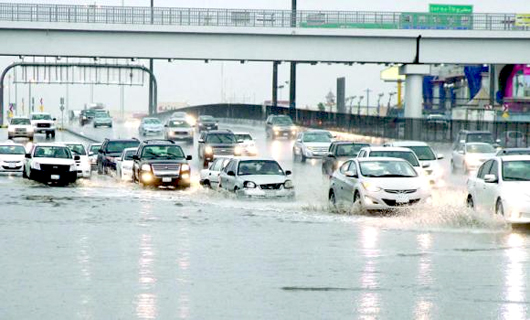Riyadh, Mar 20: Heavy rains lashed Riyadh on Thursday morning causing congestions on main traffic arteries.
Rainwater flooded the new Al-Kharj road. Industrial areas were inundated. Traffic police diverted traffic on the new Al-Kharj road to the old Al-Kharj road to enable workers to make their way to their offices.
Motorists using the airport highway to the city center were caught up in traffic snarls.

Al-Jouf region, including the city centers of Sakaka and Zaloom, Al-Kharj district, Makkah, Khurmah province and places such as Muzamiyah, Quwaiyath, Murat and Ghat in the Riyadh region experienced torrential rains, while Taif received light showers.
Abdul Kareem Mohamed Ashraff, top executive at a food company, said that it took him more than two-and-a-half hours to reach his office because of heavy rains. “The whole new Al-Kharj road from Exit 18 was impassable due to floods,” he said.
Packeer Alithamby, an accountant at a steel factory in the industrial zone, told Arab News that it took him four hours to reach his workplace, which normally would have taken 30 minutes. “I saw the underpass on the new Al-Kharj road was flooded and it was impassable,” he said.
Hameed Mowlana, who works close to the industrial area, said some of the roads flooded quickly because there is no proper drainage system in the Faisaliah district. “Roads are being dug now to install proper drainage facilities in these areas,” he said. The district houses more than 200 warehouses of large suppliers of food, industrial spares, textiles and building materials.
The Presidency of Meteorology and Environment (PME) said that rainfall with thunderstorms accompanied by cold winds would affect regions of Riyadh, the Eastern Province, Qassim, Hail, Northern Border and Al-Jouf. Similar climatic conditions will prevail in the highland regions of Makkah, Baha, Asir and Najran.
Surface winds and rising dust will reduce visibility in Madinah and Tabuk, while people will notice a drop in temperatures in the northwest and west of the Kingdom. Fog is also expected in the northern and eastern regions of the Kingdom.




Comments
Add new comment